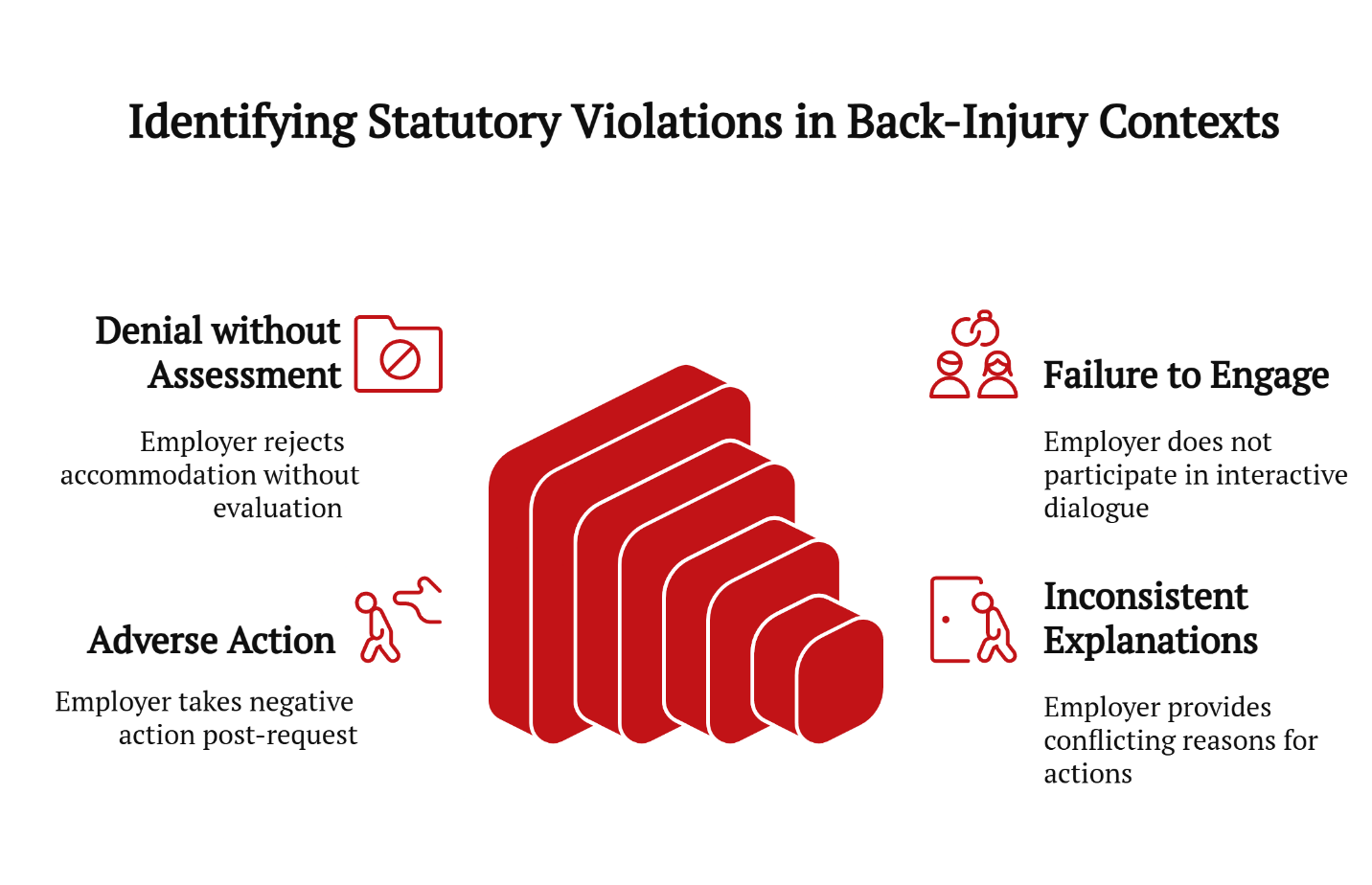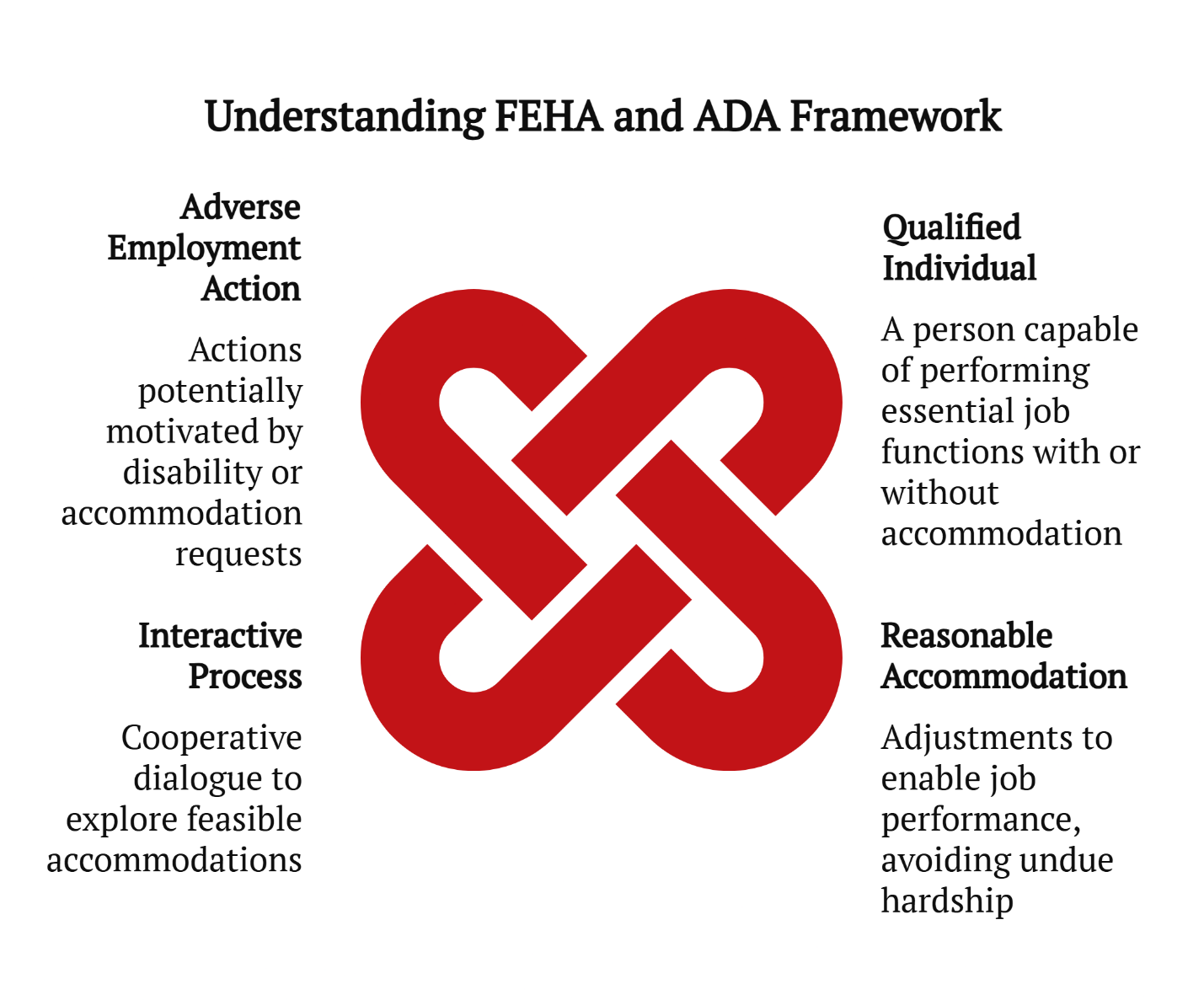📌 Key Takeaways
When your livelihood is on the line, understanding how the law protects you is the first step toward safeguarding your rights.
Know the Statutory Protections: California’s FEHA and the federal ADA prohibit disability-based terminations and require reasonable accommodations for qualified employees.
Recognize Employer Obligations: Covered employers must engage in a statutorily mandated interactive process to assess and provide appropriate accommodations.
Spot Red Flags Early: Sudden termination after disclosing a back injury or requesting accommodations may indicate potential statutory non-compliance.
Industry Patterns Matter: Physically demanding sectors such as construction, healthcare, and manufacturing have documented histories of FEHA and ADA violations.
Professional Guidance is Essential: Qualified legal counsel can evaluate specific facts, confirm statutory coverage, and determine potential claims.
Knowing the legal framework empowers you to identify when your workplace rights may be at risk.
In California, wrongful termination due to a back injury may indicate non-compliance with two complementary statutory frameworks—the Fair Employment and Housing Act (FEHA) (Gov. Code § 12940) and Title I of the Americans with Disabilities Act (ADA)—when an employer takes an adverse employment action that may be motivated by disability, denies reasonable accommodation, or fails to engage in the statutorily mandated interactive process. Recognition of these potential statutory violations depends on identifying the timing, context, and nature of the employment action in relation to disability status and essential job functions. Laws are subject to change; consult official statutory sources for current language.
Statutory Coverage: Recognition, Not Procedure
FEHA and the ADA operate together to prohibit discrimination against a qualified individual with a disability and to require reasonable accommodation to enable performance of essential job functions. Both statutes require a good-faith interactive process between employer and employee. When termination occurs soon after disclosure of a back injury or an accommodation request, the temporal proximity may be a factor suggesting possible non-compliance.
Potential Recognition Cues in Back-Injury Contexts

Indicators that may suggest a statutory violation include:
- Accommodation denial without individualized assessment: Employer rejects assistive devices, modified duties, or adjusted schedules without evaluating whether these changes would address limitations while maintaining essential functions.
- Failure to participate in the interactive process: No substantive dialogue or exploration of alternatives after disclosure of limitations.
- Adverse action closely following disclosure or request: Termination, demotion, or reduction in hours occurring shortly after a back-injury accommodation request.
- Inconsistent explanations that may suggest pretext: Shifting or conflicting reasons for termination when compared with prior performance records or treatment of similarly situated employees (comparators).
Note: These are illustrative examples only and do not determine whether a legal violation exists.
Lawful vs. Potentially Unlawful Conduct at a High Level
Potentially compliant conduct may include:
- Temporary restructuring of marginal duties after mutual discussion about essential functions.
- Time-limited light duty supported by documented operational needs.
- Application of neutral attendance rules following accommodation discussions.
Potentially non-compliant conduct may include:
- Blanket refusals to consider modifications.
- Termination immediately after receiving medical restrictions.
- Statements indicating reluctance to employ individuals with lifting limitations.
Note: These distinctions are educational only and not a substitute for professional evaluation.
Industry-Specific Hypotheticals (Illustrative Only)
These examples illustrate general legal concepts only. Individual circumstances require professional legal evaluation. They do not constitute legal advice or case-outcome predictions.
- Construction: A carpenter with a documented back injury requests mechanical lifting aids. The request is declined without discussion, and termination follows within days.
- Warehouse/Manufacturing: A picker asks for a waist-high workstation; employer cites a “no modifications” policy and proceeds with termination.
- Transportation: A delivery driver provides medical limitations requiring team lifts; the employer terminates employment without an accommodation meeting.
How FEHA and ADA Define the Framework (Non-Procedural)

- Qualified individual: One who can perform essential job functions with or without reasonable accommodation.
- Reasonable accommodation: Adjustments such as assistive equipment, task reassignment of non-essential duties, or scheduling changes—unless such changes cause undue hardship.
- Interactive process: A timely, cooperative dialogue to explore feasible accommodations; refusal to participate may be a statutory violation.
- Adverse employment action: Actions like termination, demotion, or significant schedule changes that may be motivated by disability or an accommodation request.
Note: All statutory and regulatory references should be verified against current official sources.
When to Seek Professional Evaluation
While this content is for general informational purposes only, certain fact patterns often prompt consultation with an employment law attorney for rights determination:
- Rapid termination after back-injury disclosure or accommodation request.
- Categorical denial of ergonomic or mechanical aids without assessment.
- Refusal to consider task reallocation of non-essential duties.
- Discrepancies between stated reason for termination and employment history.
Professional consultation is essential because rights and remedies depend on specific facts, applicable statutory language, and jurisdictional interpretations, all of which may change over time.
Disclaimer:
This content is for informational purposes only. This content is not legal advice. No attorney-client relationship is formed through this content. Please consult a qualified attorney in your jurisdiction for legal advice specific to your situation.
Protect Your Rights | The Akopyan Law Firm, A.P.C. | Top Gun Employment Lawyers
Have you been wrongfully terminated from your job? Have you suffered discrimination, harassment, or retaliation in the workplace? Has your employer violated wage and hour laws? If so, we can help. The Akopyan Law Firm, A.P.C. is dedicated to protecting and enforcing employees’ rights throughout Southern California. With a 97% success rate and millions recovered for our clients, our team of experienced and talented employment lawyers can fight to secure the justice you deserve.
Take the First Step Towards Securing Justice: Call us today to speak with one of our experienced employment lawyers. The firm offers case evaluations free of charge.
Contact Us Today:
- Phone: (818) 509-9975
- Office Locations: Los Angeles, Bakersfield, Costa Mesa, Temecula, Rancho Cucamonga, Oxnard, Culver City, and San Diego in California.
Important: Contacting the Akopyan Law Firm, A.P.C. does not create an attorney-client relationship, but all communications will remain private and confidential. Each case is unique. The Akopyan Law Firm, A.P.C., does not guarantee any outcome.

